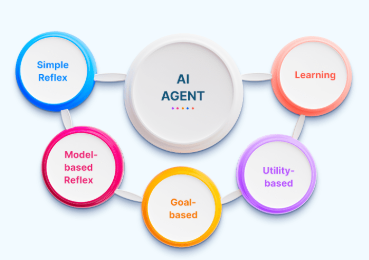What is AI Agents?
The landscape of business is set to change dramatically by 2027, with half of the companies adopting generative AI planning to implement AI agents. These intelligent systems will act as smart assistants, capable of managing complex tasks with minimal human intervention. Deloitte forecasts that AI agents will revolutionize industries such as software development, healthcare, and customer service.
About AI Agents
AI agents are autonomous systems designed to interact with their environment. They employ sensors to collect information, a control center for data processing, and effectors to execute actions. As technology evolves, these agents will tackle increasingly sophisticated tasks, including real-time traffic management and personalized education.
Applications Across Industries
AI agents will find applications in various fields. In software development, they can automate coding tasks. In healthcare, they may assist in diagnostics and patient management. In customer service, AI agents can enhance user experience through efficient query handling and support.
Advantages of AI Agents
The introduction of AI agents promises several benefits. They can bridge skills gaps by performing specialised tasks. Their ability to process information rapidly enables them to solve complex problems at scale. This can lead to increased productivity and innovation across sectors.
Potential Risks and Concerns
Despite their advantages, AI agents pose risks. Technical issues such as errors and security vulnerabilities are prevalent. Ethical concerns arise regarding decision-making without human oversight. Additionally, there are fears of job displacement and excessive reliance on AI technologies.
To mitigate risks, businesses must prioritise transparency and maintain human involvement in decision-making. Establishing ethical guidelines that focus on privacy and accountability is crucial. Implementing robust data security measures and educating the public about AI’s limitations will also help prevent over-reliance on these systems.
GKToday Facts for Exams:
- AI Agents AI agents are autonomous systems that interact with their environment. They utilise sensors for information gathering and effectors to execute actions effectively.
- Generative AI Generative AI refers to algorithms capable of creating new content. This technology is expected to revolutionise industries by automating complex tasks across various sectors.
- Ethical Guidelines Ethical guidelines for AI prioritise privacy and accountability. They are essential for ensuring responsible decision-making and maintaining human oversight in automated processes.
- Skills Gaps Skills gaps refer to discrepancies between required skills and available talent. AI agents can bridge these gaps by automating specialised tasks and enhancing workforce capabilities.
Month: Current Affairs - December, 2024
Category: Science & Technology Current Affairs







